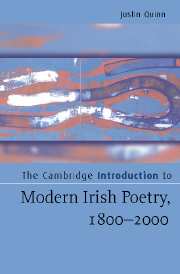Book contents
- Frontmatter
- Contents
- Acknowledgements
- Introduction
- 1 The appearance of Ireland
- 2 Tennyson's Ireland
- 3 Revival
- 4 W. B. Yeats
- 5 Wild earth
- 6 The ends of Modernism: Kinsella and Irish experiment
- 7 Ireland's Empire
- 8 Seamus Heaney
- 9 Irsko po Polsku: poetry and translation
- 10 Feminism and Irish poetry
- 11 Out of Ireland: Muldoon and other émigrés
- 12 The disappearance of Ireland
- Notes
- Guide to further reading
- Index
8 - Seamus Heaney
Published online by Cambridge University Press: 05 June 2012
- Frontmatter
- Contents
- Acknowledgements
- Introduction
- 1 The appearance of Ireland
- 2 Tennyson's Ireland
- 3 Revival
- 4 W. B. Yeats
- 5 Wild earth
- 6 The ends of Modernism: Kinsella and Irish experiment
- 7 Ireland's Empire
- 8 Seamus Heaney
- 9 Irsko po Polsku: poetry and translation
- 10 Feminism and Irish poetry
- 11 Out of Ireland: Muldoon and other émigrés
- 12 The disappearance of Ireland
- Notes
- Guide to further reading
- Index
Summary
One of the remarkable aspects of imperial expansion is the way that it makes diverse languages engage with one another. Loan words and syntactical constructions go flying back and forth, changing the nature of not only the language of the colonised people, but also of the colonisers themselves. Thus, Hindi is transformed by the British Empire's presence in India, but that language in its turn transforms English. One index of that are the 426 words in the English language that the OED lists as being of Hindi origin; not to mention the 210 from Urdu and the 82 from Tamil, to give but two further examples of India's many languages. Because of the success of the Empire, the English language appears to be outstandingly impure; also, it never suffered attempts to purge it of foreign elements, as, say, did Hungarian in the nineteenth century. Of course, no language is really ‘pure’ or ‘impure’ – that is just a trick of chronological perspective. English seems ‘impure’ in this respect only because it was invaded by so many foreign words as recently as the last few centuries.
Restricting our perspective to what has been called the Britannic Isles, we witness the interaction of several languages in the imperial pressure-cooker – among them, Irish, English, Scots, Scots Gaelic, Welsh and Cornish. English is undoubtedly triumphant among them as the first language of Britain and Ireland, as most of the others are to varying degrees struggling to survive, and Cornish is extinct.
- Type
- Chapter
- Information
- The Cambridge Introduction to Modern Irish Poetry, 1800–2000 , pp. 130 - 142Publisher: Cambridge University PressPrint publication year: 2008



